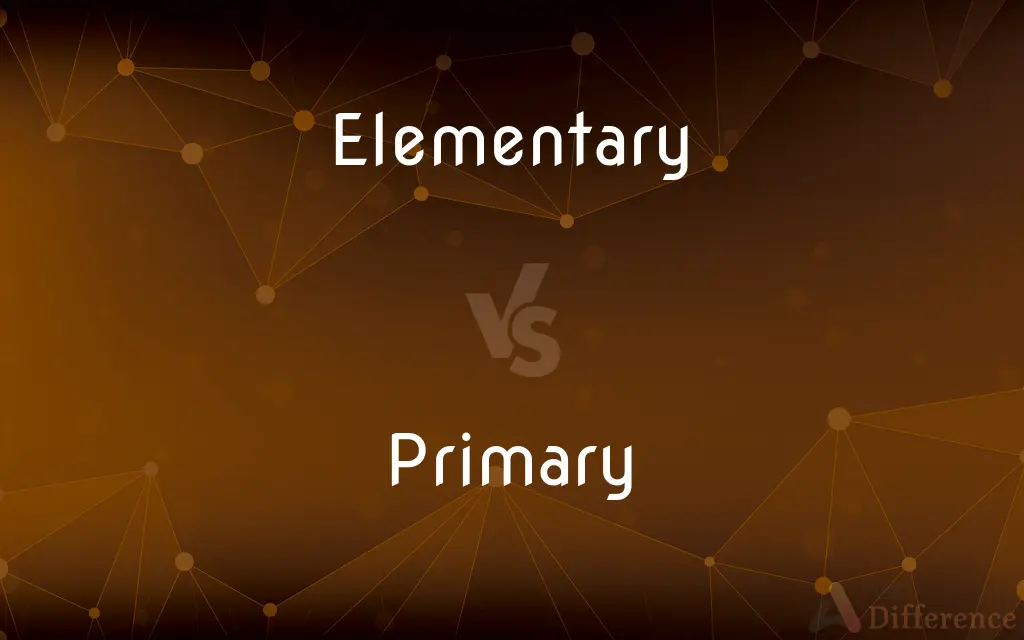Elementary vs. Primary — What's the Difference?
By Tayyaba Rehman & Maham Liaqat — Updated on March 11, 2024
Elementary education focuses on basic academic learning and socialization skills, while primary education serves as the initial stage of formal education, usually involving the first few years.

Difference Between Elementary and Primary
Table of Contents
ADVERTISEMENT
Key Differences
Elementary education is often considered the first tier of formal education following preschool or kindergarten. While primary education, which is sometimes used interchangeably with elementary education, specifically refers to the first few years of formal education.
Elementary education is designed to build a strong foundation in key academic areas, with an emphasis on developing basic literacy and numeracy skills. Whereas primary education, though essentially serving the same foundational purpose, often places a stronger emphasis on broad, holistic child development, including social, physical, and emotional aspects, alongside academic learning.
In the context of curriculum and pedagogy, elementary education may focus more on the acquisition of specific skills and knowledge through structured lessons and assessments. On the other hand, primary education might adopt a more integrated approach, incorporating project-based learning, play, and exploratory activities to engage students in a wide range of learning experiences.
Regarding age groups, elementary education in the U.S. generally caters to children from ages 6 to 11 or 12, depending on the grade structure. Conversely, primary education usually encompasses a similar age range but can start as early as age 4 or 5 in some countries, especially those with a two-tier division of primary and secondary education without a middle school system.
While the terms "elementary" and "primary" education are often used interchangeably in the United States, distinguishing between them can highlight subtle differences in educational focus, pedagogical approaches, and sometimes the age range of the students. This distinction is more pronounced in international contexts, where educational systems and terminology vary more significantly.
ADVERTISEMENT
Comparison Chart
Definition
The first stage of formal education after preschool
Often synonymous with elementary, but varies globally
Age Range
Typically 6-11 or 12 years old
Can start from 4 or 5 years old depending on the country
Focus
Basic literacy, numeracy, and introductory sciences
Holistic development including social and emotional skills
Curriculum
Structured lessons and assessments
Can include more integrated and exploratory activities
Global Use
Primarily in the U.S.
Common in the UK and other Commonwealth countries
Compare with Definitions
Elementary
The initial stage of formal education focusing on foundational academic skills.
She began her elementary education at the local public school, learning the basics of reading and math.
Primary
Often the first stage of formal education, focusing on broad child development.
His primary education began with learning through play and exploration.
Elementary
Typically serves children from 6 to 11 or 12 years old.
Elementary schools are filled with children in their early educational journey.
Primary
To foster comprehensive development, including social and emotional aspects.
Primary education aims to develop well-rounded individuals from a young age.
Elementary
To establish a foundation in key academic areas and socialization.
Her elementary years laid the groundwork for lifelong learning skills.
Primary
Usually starts from age 4 or 5, depending on the country.
At primary school, children start their formal education journey earlier.
Elementary
Emphasizes structured learning and assessments.
Elementary education uses standardized tests to assess student progress.
Primary
Can be more integrated, including academic and developmental goals.
The primary school curriculum emphasizes holistic growth alongside academics.
Elementary
Centers on core subjects like math, reading, science, and social studies.
The elementary curriculum is designed to introduce students to a broad range of subjects.
Primary
May incorporate more project-based and exploratory activities.
Primary education often involves learning through projects and group work.
Elementary
Of, relating to, or constituting the basic, essential, or fundamental part
An elementary need for love and nurturing.
Primary
Of chief importance; principal
The government's primary aim is to see significant reductions in unemployment
Elementary
Of, relating to, or involving the fundamental or simplest aspects of a subject
An elementary problem in statistics.
Primary
Earliest in time or order
The primary stage of their political education
Elementary
Of or relating to an elementary school or elementary education
The elementary grades.
Elementary teachers.
Primary
Not derived from, caused by, or based on anything else; original
His expert handling of the primary and secondary literature is clear on every page
Elementary
Relating to the basic, essential or fundamental part of something.
Primary
Relating to or denoting education for children between the ages of about five and eleven
A primary teacher
Elementary
Relating to an elementary school.
Primary
Former term for Palaeozoic
Elementary
(physics) Relating to a subatomic particle.
Primary
Relating to or denoting the input side of a transformer or other inductive device.
Elementary
(archaic) Sublunary; not celestial; belonging to the sublunary sphere, to which the four classical elements (earth, air, fire and water) were confined; composed of or pertaining to these four elements.
Primary
(of an organic compound) having its functional group located on a carbon atom which is bonded to no more than one other carbon atom
A primary alcohol
Elementary
An elementary school
Primary
(in the US) a preliminary election to appoint delegates to a party conference or to select the candidates for a principal, especially presidential, election
These two republicans should win their primaries easily
Elementary
A supernatural being which is associated with the elements.
Primary
A primary colour.
Elementary
Having only one principle or constituent part; consisting of a single element; simple; uncompounded; as, an elementary substance.
Primary
The Palaeozoic era.
Elementary
Pertaining to, or treating of, the elements, rudiments, or first principles of anything; initial; rudimental; introductory; as, an elementary treatise.
Primary
First or highest in rank or importance; principal.
Elementary
Pertaining to one of the four elements, air, water, earth, fire.
Primary
Occurring first in time or sequence; earliest
The primary stages of the project.
Elementary
Easy and not involved or complicated;
An elementary problem in statistics
Elementary, my dear Watson
A simple game
Found an uncomplicated solution to the problem
Primary
Of or relating to primary schools.
Elementary
Of or being the essential or basic part;
An elementary need for love and nurturing
Primary
Not derived from anything else; basic or original
The interviews and other primary materials in the study are more interesting than the analysis.
Primary
Immediate; direct
A primary source of information.
Primary
(Geology) Characteristic of or existing in a rock at the time of its formation.
Primary
Of or relating to a primary color or colors.
Primary
Having a word root or other linguistic element as a basis that cannot be further analyzed or broken down. Used of the derivation of a word or word element.
Primary
Referring to present or future time. Used as a collective designation for various present and future verb tenses in Latin, Greek, and Sanskrit.
Primary
Of or relating to primary stress.
Primary
(Electronics) Of, relating to, or constituting an inducting current, circuit, or coil.
Primary
Of, relating to, or designating the main flight feathers projecting along the outer edge of a bird's wing.
Primary
Of or relating to agriculture, forestry, the industries that extract natural materials from the earth, or the products so obtained
A primary commodity.
Primary
Relating to, or having a carbon atom that is attached to only one other carbon atom in a molecule.
Primary
Relating to the replacement of only one of several atoms or groups in a compound, such as an amine in which one valence of the functional group is taken by a carbon atom.
Primary
(Botany) Of, relating to, or derived from a primary meristem.
Primary
One that is first in time, order, or sequence.
Primary
One that is first or best in degree, quality, or importance.
Primary
One that is fundamental, basic, or elemental.
Primary
A meeting of the registered voters of a political party for the purpose of nominating candidates and for choosing delegates to their party convention.
Primary
A preliminary election in which the registered voters of a political party nominate candidates for office.
Primary
A primary color.
Primary
A primary flight feather.
Primary
(Electronics) An inducting current, circuit, or coil.
Primary
A celestial body, especially a star, relative to other bodies in orbit around it.
Primary
The brighter of two stars that make up a binary star.
Primary
First or earliest in a group or series.
Children attend primary school, and teenagers attend secondary school.
Primary
Main; principal; chief; placed ahead of others.
Preferred stock has primary claim on dividends, ahead of common stock.
Primary
(geology) Earliest formed; fundamental.
Primary
(chemistry) Illustrating, possessing, or characterized by, some quality or property in the first degree; having undergone the first stage of substitution or replacement.
Primary
(medicine) Relating to the place where a disorder or disease started to occur.
Primary
(medicine) Relating to day-to-day care provided by health professionals such as nurses, general practitioners, dentists etc.
Primary
A primary election; a preliminary election to select a political candidate of a political party.
Primary
The first year of grade school.
Primary
A base or fundamental component; something that is irreducible.
Primary
The most massive component of a gravitationally bound system, such as a planet in relation to its satellites.
Primary
A primary school.
Primary
(ornithology) Any flight feather attached to the manus (hand) of a bird.
Primary
A primary colour.
Primary
(military) The first stage of a thermonuclear weapon, which sets off a fission explosion to help trigger a fusion reaction in the weapon's secondary stage.
Primary
(aviation) A radar return from an aircraft (or other object) produced solely by the reflection of the radar beam from the aircraft's skin, without additional information from the aircraft's transponder.
Primary
(medicine) Primary site of disease; original location or source of the disease.
Unknown primary
Most common primaries
Primary
(electronics) A directly driven inductive coil, as in a transformer or induction motor that is magnetically coupled to a secondary
Primary
To challenge (an incumbent sitting politician) for their political party's nomination to run for re-election, through running a challenger campaign in a primary election, especially one that is more ideologically extreme.
Primary
To take part in a primary election.
Primary
First in order of time or development or in intention; primitive; fundamental; original.
The church of Christ, in its primary institution.
These I call original, or primary, qualities of body.
Primary
First in order, as being preparatory to something higher; as, primary assemblies; primary schools.
Primary
First in dignity or importance; chief; principal; as, primary planets; a matter of primary importance.
Primary
Earliest formed; fundamental.
Primary
Illustrating, possessing, or characterized by, some quality or property in the first degree; having undergone the first stage of substitution or replacement.
Primary
That which stands first in order, rank, or importance; a chief matter.
Primary
A primary meeting; a caucus.
Primary
One of the large feathers on the distal joint of a bird's wing. See Plumage, and Illust. of Bird.
Primary
A primary planet; the brighter component of a double star. See under Planet.
Primary
A preliminary election where delegates or nominees are chosen
Primary
One of the main flight feathers projecting along the outer edge of a bird's wing
Primary
Coil forming the part of an electrical circuit such that changing current in it induces a current in a neighboring circuit;
Current through the primary coil induces current in the secondary coil
Primary
Of first rank or importance or value; direct and immediate rather than secondhand;
Primary goals
A primary effect
Primary sources
A primary interest
Primary
Not derived from or reducible to something else; basic;
A primary instinct
Primary
Most important element;
The chief aim of living
The main doors were of solid glass
The principal rivers of America
The principal example
Policemen were primary targets
Primary
Of or being the essential or basic part;
An elementary need for love and nurturing
Primary
Of primary importance;
Basic truths
Common Curiosities
What is the main focus of elementary education?
Elementary education primarily focuses on basic academic learning, such as literacy and numeracy.
At what age does elementary education typically start in the U.S.?
In the U.S., elementary education usually starts at age 6.
Do elementary and primary education cover the same subjects?
Generally, yes, but the approach and emphasis on subjects might differ.
How do teaching methods differ between elementary and primary education?
Elementary may focus more on direct instruction, while primary may use more exploratory and project-based methods.
How does primary education address emotional development?
Through activities that promote empathy, self-awareness, and cooperation.
Can a student skip primary education?
Skipping primary education is not advisable as it covers fundamental learning stages.
How does primary education differ in its objectives?
Primary education aims for a broader development, including emotional and social skills, alongside academics.
Why is primary education important?
It lays the foundation for lifelong learning and personal development.
Can primary education start earlier than elementary education?
Yes, in some countries, primary education starts as early as age 4 or 5.
Is the curriculum in elementary education more structured than in primary?
Yes, elementary education often has more structured lessons and assessments compared to primary education's integrated approach.
Is elementary education the same worldwide?
The concept of elementary education is similar worldwide, but the structure, terminology, and specifics can vary.
What role does socialization play in elementary education?
It's crucial for developing interpersonal skills and understanding societal norms.
Are standardized tests more common in elementary or primary education?
They are more common in elementary education, especially in the U.S.
Do both elementary and primary education require qualified teachers?
Yes, both stages require educators trained in early childhood and elementary education.
Is parental involvement important in both educational stages?
Yes, active parental involvement is critical to student success in both elementary and primary education.
Share Your Discovery

Previous Comparison
Falcon vs. Buzzard
Next Comparison
Advertising vs. PromotionAuthor Spotlight
Written by
Tayyaba RehmanTayyaba Rehman is a distinguished writer, currently serving as a primary contributor to askdifference.com. As a researcher in semantics and etymology, Tayyaba's passion for the complexity of languages and their distinctions has found a perfect home on the platform. Tayyaba delves into the intricacies of language, distinguishing between commonly confused words and phrases, thereby providing clarity for readers worldwide.
Co-written by
Maham Liaqat













































